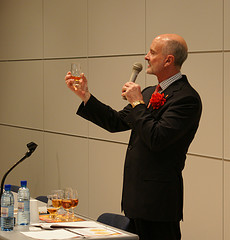Interview: Tom Bulleit of Bulleit Bourbon
By Chuck Sudo in Food on Apr 10, 2008 8:00PM
 Bulleit Bourbon is one of the more recognizable and smoothest brands of bourbon on the market. Sold in bathtub liquor bottles, Bulleit teems with a great mouthfeel and maturity to the blend not normally found on bourbons aged 6-8 years. The secret lies in a family recipe created by Augustus Bulleit in New Orleans in the early 1800's, a recipe that stayed in the family as they made their way to Kentucky.
Bulleit Bourbon is one of the more recognizable and smoothest brands of bourbon on the market. Sold in bathtub liquor bottles, Bulleit teems with a great mouthfeel and maturity to the blend not normally found on bourbons aged 6-8 years. The secret lies in a family recipe created by Augustus Bulleit in New Orleans in the early 1800's, a recipe that stayed in the family as they made their way to Kentucky.
After a career in law, Tom Bulleit decided to take the plunge in the family tradition, starting Bulleit Bourbon in 1987. Nearly ten years later, Seagram purchased Bulleit. In 2001, Diageo acquired Bulleit when it purchased a 2/3 share of Seagram.
Through it all, Bulleit has remained active in promoting and ensuring the quality of the bourbon that bears his name. We had the opportunity to sit down with Bulleit after WhiskyFest for an interview.
Chicagoist: What made you ultimately take the transition from being a lawyer to a bourbon distiller, beside the family tradition?
Tom Bulleit: Well, I practiced law for thirty years. I'm older than dirt. I grew up working in a distillery, the Bernheim distillery. I worked there between school terms, and earned my law degree on the GI Bill. But I always wanted to be in the business, although my mother said after I indicated I was interested in distilling, "you'll be going in the military, then you're going to be a lawyer." And in 1987 I went to my dad and said, "I really want to do this." He said, "Well, that's between you and your banker." That would have been a yes.
C: So you received their blessing. Did you give up the day job immediately?
TB: Not at all. I did both for many years, borrowed a lot of money from my banker. At times my wife would look at me and wonder what was going on. That's when Seagram bought us in '97. In 2001 Diageo bought Seagram. I like to call it "falling uphill."
C: Was there ever a point in the family history where the bourbon recipe was lost?
TB: Not really. Although when I was working in the distilleries and my father saw that I was enjoying what I did there, he took me aside and gave me the family recipe, said that we have a distilling tradition in the family. I think he saw that I was taking to the discipline. It seems kind of odd that one would have a family recipe for bourbon, but in our part of Kentucky everyone has one.
C: There's been a lot of consolidation going on in the spirits industry in recent years. As a businessman, do you keep an eye on that?
TB: A little bit. The consolidation (of the industry) has really picked up speed in the past four or five years. You see the huge numbers being bandied about for some brands, and how many different brands are controlled by one company, and you start to think about antitrust laws because the number of companies is getting smaller.
When Diageo bought 2/3 of Seagram in 2001, Allied Domecq bought the other third. Three years ago, Allied Domecq was bought by Pernod Ricard. I'm still amazed that Allied Domecq doesn't exist anymore.
C: How much input do you still have in the day-to-day business for Bulleit?
TB: Oh, I'm still active. I was on 140 flights last year, traveling around to promote the product.
C: Does Diageo let you have free rein over the product?
TB: Of course. We still distill the bourbon the same way we always have. The marketing of the product has been amazing, and we talk all the time about new ideas.
C: I would also assume that, since you're bourbon is part of the Diageo portfolio, you're shipping off barrels to scotch distilleries, as well.
TB: Once we're done with the barrels, they're sent over to Johnnie Walker where they'll age the blended scotches.
C: Bulleit is one of the smoother bourbons on the market. How long do you let it age before bottling?
TB: We age it between six and eight years, although when we feel the distillate reaches the right maturity, we'll bottle it. There's a difference between aging and maturity, and we'll never bottle bourbon until it's ready to reach the customer.
Photo courtesy of jmrocher on flickr.